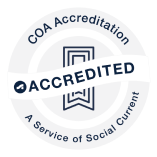What are the benefits of becoming a foster parent?
There is no greater reward than helping a child thrive and grow into a well-adjusted socially responsible, self-sufficient, stable adult. You will have the joy of knowing you played an integral part in changing a child’s life.
Can single people and non-married couples become foster parents?
Yes. Adults 21 years or older who successfully complete the screening and certification process are eligible to become foster parents.
Can LGBTQ+ people become foster parents?
Absolutely! New York State Office of Child and Family Services (OCFS) and Glove House actively encourages recruitment efforts to increase the diversity of families applying to become resources for youth in foster care, including LGBTQ-led homes to be more reflective of the diversity of the youth we serve.
Do foster parents receive financial assistance?
Foster parents receive a monthly payment allowance to help cover a portion of the costs incurred by caring for children in their home. Foster care payments vary depending on age of children and whether they are identified as special or exceptional needs. Also, funds may be available for costs associated with initial placement such as clothing, beds, gates, car seats, etc.
Can foster families adopt their foster children?
Glove House is not an adoption agency, and the goal of foster care is family reunification. More than half of children who go into foster care return to their birth families. When the children are not able to be reunited with their birth family- adoption becomes the goal. Glove House works along side the County who will proceed with adoption process.
Do foster children see their biological parents during the time they are in foster care?
Most children in foster care visit their biological parents or siblings on a regular basis, often once a week, as part of the court-ordered plan to reunite the family.
Do foster parents have a choice on the child that they take into their home?
Children are placed in foster homes by matching their needs with the foster parent(s)' or family's situation and strengths. A foster parent will never be asked to accept a foster child they are not prepared to help. The foster parent selects the level of need and age group of the children that they would like to foster.
Can foster parents work outside of the home?
Many foster parents do work outside of the home since one of the requirements of becoming a foster parent is financial stability. Ongoing placements may be eligible for daycare reimbursement for working parents through the County that holds custody of the child.
What kinds of challenges do the children generally have?
Children who have been removed from their homes due to abuse, abandonment or neglect. These children have different types of trauma that will need to be addressed. You will learn how to work with the behaviors they exhibit due to the trauma in your certification classes as well as ongoing continuing education training.
What types of children are waiting to be placed in foster care?
Children of all ages, origins, religions, ethnicity, backgrounds, sexual orientations, gender identities and expressions are in foster care. However, they share one common thread as all these children need loving families and a place to call home.



